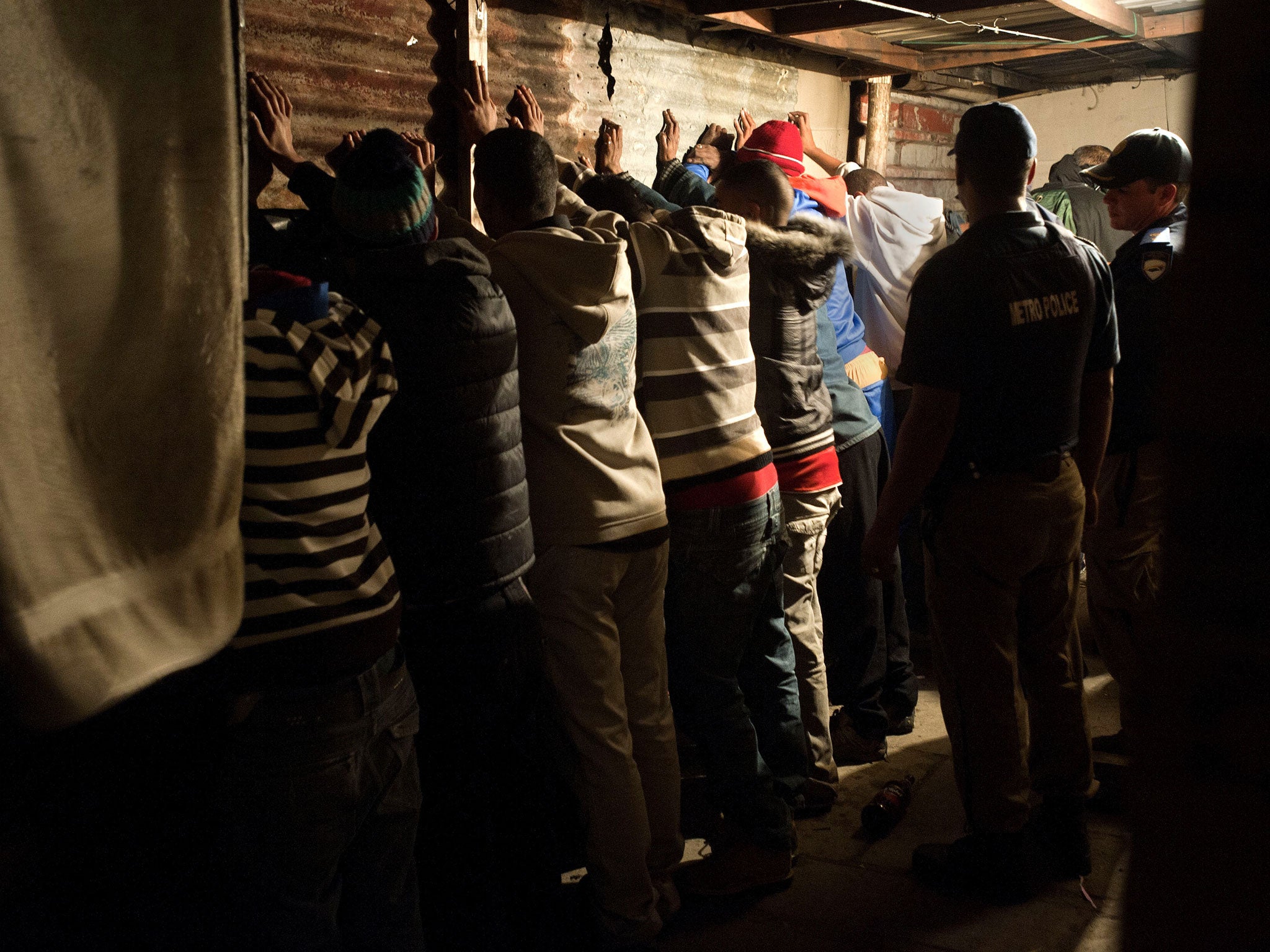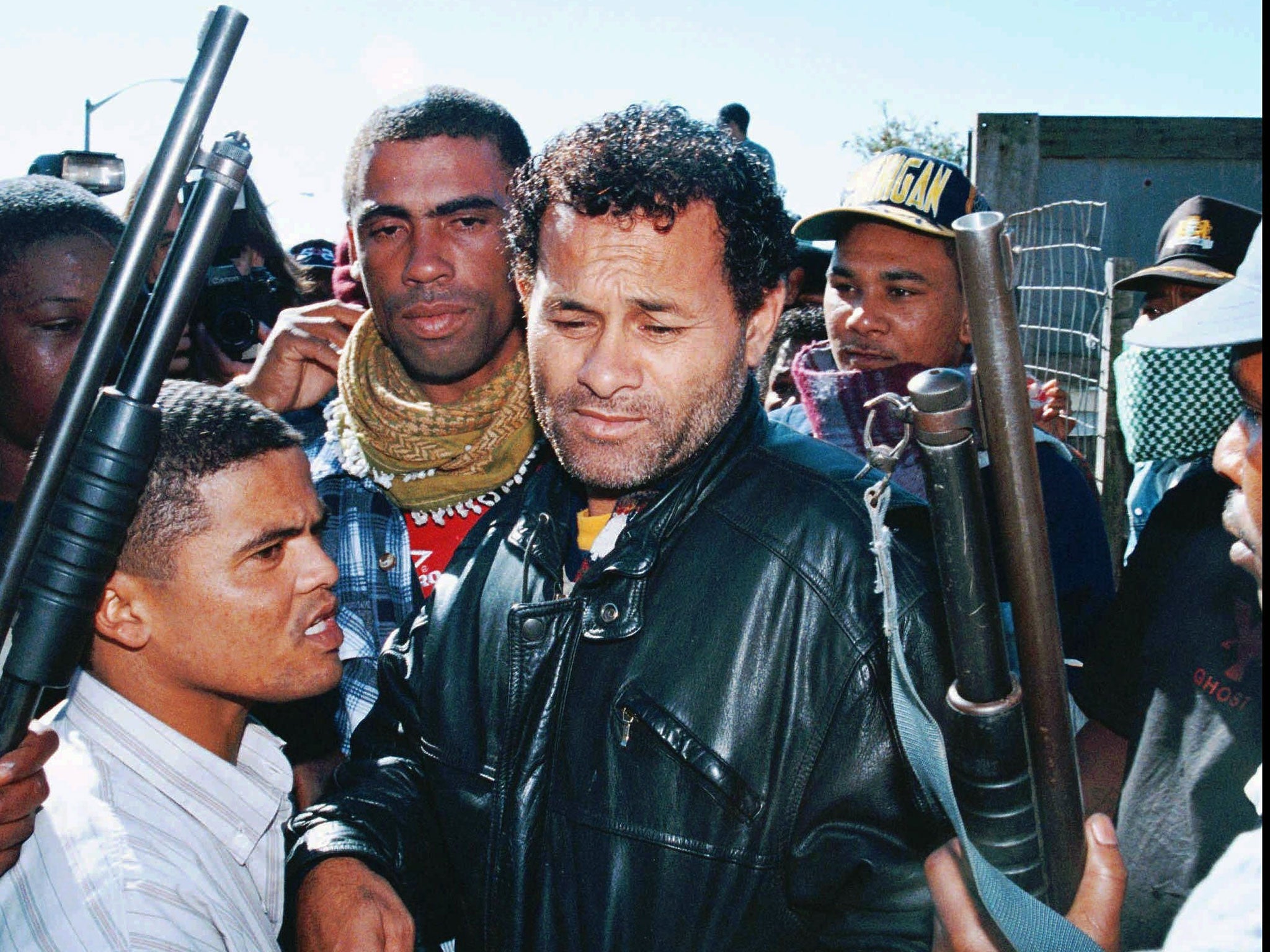The Cape of bad dope: Gang warfare in South Africa is out of control - and set to get worse as a key leader leaves prison
Rashied Staggie, the head of the Hard Livings gang, was jailed a decade ago for ordering the rape of a teenager and will be released from a Cape Town prison on 23 September

Your support helps us to tell the story
From reproductive rights to climate change to Big Tech, The Independent is on the ground when the story is developing. Whether it's investigating the financials of Elon Musk's pro-Trump PAC or producing our latest documentary, 'The A Word', which shines a light on the American women fighting for reproductive rights, we know how important it is to parse out the facts from the messaging.
At such a critical moment in US history, we need reporters on the ground. Your donation allows us to keep sending journalists to speak to both sides of the story.
The Independent is trusted by Americans across the entire political spectrum. And unlike many other quality news outlets, we choose not to lock Americans out of our reporting and analysis with paywalls. We believe quality journalism should be available to everyone, paid for by those who can afford it.
Your support makes all the difference.Shireen Alexander takes a break from making chips to point out the bullet holes peppering the café she runs from her home, which has been caught in the middle of a three-month gang turf war in Cape Town’s south-eastern suburb of Manenberg.
She has spent evenings huddled at the foot of her stairs with her 18-year-old daughter as the gangs – known as the Hard Livings and the Americans – exchanged fire. Six bullets punctured her steel gate. Another came through the bedroom window and hit a prayer robe she had hung up seconds earlier.
South African police estimate about 100,000 gang members compete for turf and control of the drug trade in the Western Cape province, the bulk of them in the urban sprawl on Cape Town’s eastern outskirts, known as the Cape Flats.
“They stand on my corner and they shoot,” Ms Alexander, 50, said as she wiped her hands on her black-and-red pinstripe apron. “It’s been the longest gang fight we have ever had here. It was petrifying.”
The gang warfare is frustrating efforts to rein in crime in a country where 15,609 homicides, or 30.9 per 100,000 people, occurred in the year ending March 2012, a rate that is more than six times that of the US.
Today, South Africa’s Police Minister, Nathi Mthethwa, released new crime figures confirming that, year on year, the murder rate has increased by 0.6 per cent, and attempted murder rose by 6.5 per cent.
“We have seen increases in murder, attempted murder, car hijacking, street robbery and house robbery. These are some of the crimes South Africans are most afraid of,” Institute for Security Studies (ISS) researcher Jonathan Rees said in a statement.
“This shows that government’s approach to crime is not working. After a long period of decreases in serious and violent crime, these are the worst figures we have seen in 10 years,” said another ISS researcher, Gareth Newham, adding that crime is not only a police responsibility, but that government departments such as the health, education and social development ministries all have their roles to play.
“Violence remains unacceptably high and should be treated as a serious crisis which stands in the way of South Africa’s social and economic development,” Mr Newham said.
Preliminary police data shows Manenberg alone had 14 homicides and 56 attempted murders between May and July this year, double the quarterly average over the past decade. While the spike will only be reflected in next year’s statistics, the upsurge in violence prompted Western Cape Premier Helen Zille to call for the army to be deployed to restore calm.
The conflict forced the closure of 14 schools for two days last month. Fighting has eased since 22 August when church and community groups brokered a truce and police stepped up raids and patrols, making more than 1,200 arrests.
Ms Zille, leader of South Africa’s main opposition party, the Democratic Alliance, blames the flare-up on gangsters trying to assert control over the trade of drugs such as mandrax and crystal methamphetamine, known locally as “tik”, before Hard Livings leader Rashied Staggie’s forthcoming release from a Cape Town prison on parole on 23 September.

Staggie was jailed a decade ago for ordering the rape of a teenager. The woman, who testified against him, was shot five times by gunmen on 30 July. She survived and is now in a witness protection programme.
The Staggie name made international headlines in 1996 when television crews filmed Rashied’s twin brother, Rashaad, being shot and burnt to death during a protest march staged by members of a group known as People Against Gangsterism and Drugs.
Hard Livings members deny the recent killings have anything to do with Staggie. “Four of our guys were shot dead; the youngsters took revenge,” Sidney, a 55-year-old bearded Hard Livings veteran who declined to give his surname, said in an interview as he sat on a wooden bench drinking a beer in a Manenberg tavern with seven fellow gang members. “You can’t control them any more. They smoke tik. It makes them super-people. This is the monster.”
An Americans member, who wore a Manchester United football team tracksuit top and knitted cap pulled down to his eyebrows, said the tit-for-tat killings began after one of his gang stole a mobile phone and was stabbed by a Hard Livings member.
The Cape Flats was once a dumping ground for mixed-race families evicted from areas reserved for whites by the segregationist government that ruled for more than four decades until 1994. The end of white-minority rule has changed little for most residents of Manenberg’s dilapidated three-story apartment blocks and cramped, ramshackle houses.
“Manenberg was built for 35,000 people in the 1960s,” Mario Wanza, the chairman of Proudly Manenberg, a community organisation, said in an interview. “Today we have 150,000 people living on top of each other, people taking shifts to sleep, people not having jobs, social decay. We are still witnessing the last of apartheid.”
Young people wearing hooded sweatshirts and trainers throng Manenberg’s litter-strewn sidewalks, many of them sporting tattoos that brand them members of the so-called numbers gangs, the 26s, 27s and 28s, that operate in the country’s prisons.
“There’s no work,” Michael, a 30-year-old Hard Livings member with gold-capped teeth who refused to give his surname, said in an interview. “There’s no benefit in being a gangster. I’ve got nothing else to do.”
Mr Mthethwa blames the explosion of gangs and drugs on poverty and broken families, and says Ms Zille’s idea of deploying army troops isn’t the solution.
“There appears to be such a lot of politics being played in relation to how to intervene,” Chandre Gould, a researcher at the Pretoria-based Institute for Security Studies, said. “For as long as you have a political tussle going on it makes it very difficult to get a solution that communities can believe in.”
South Africa has boosted spending on safety and security, and despite the most recent figures, has succeeded in bringing the murder rate down from 67.9 per 100,000 people in 1995, when an integrated national police force was created and national statistics were compiled for the first time. But progress has been stymied by a 25.6 per cent unemployment rate that drives many youths to crime.
“How can you have an administration that just pumps more and more police into our community?” Mr Wanza said. “It’s not the solution, but they just persist. If you are born into crime and violence, you are going to grow up into crime and violence. We must present alternatives.”
Ms Alexander, who was widowed a year ago after her husband suffered kidney failure, has no sympathy for gang members who repeatedly force her to shut her cafe and keep her daughter home from school.
“I love living in Manenberg,” she said. “The people are lovely people, we all know one another. But the gangsters are just terrible. They feel nothing for nobody. They greet you and then they stand with a gun and they shoot. It’s never going to stop.”
© Bloomberg
Join our commenting forum
Join thought-provoking conversations, follow other Independent readers and see their replies
0Comments